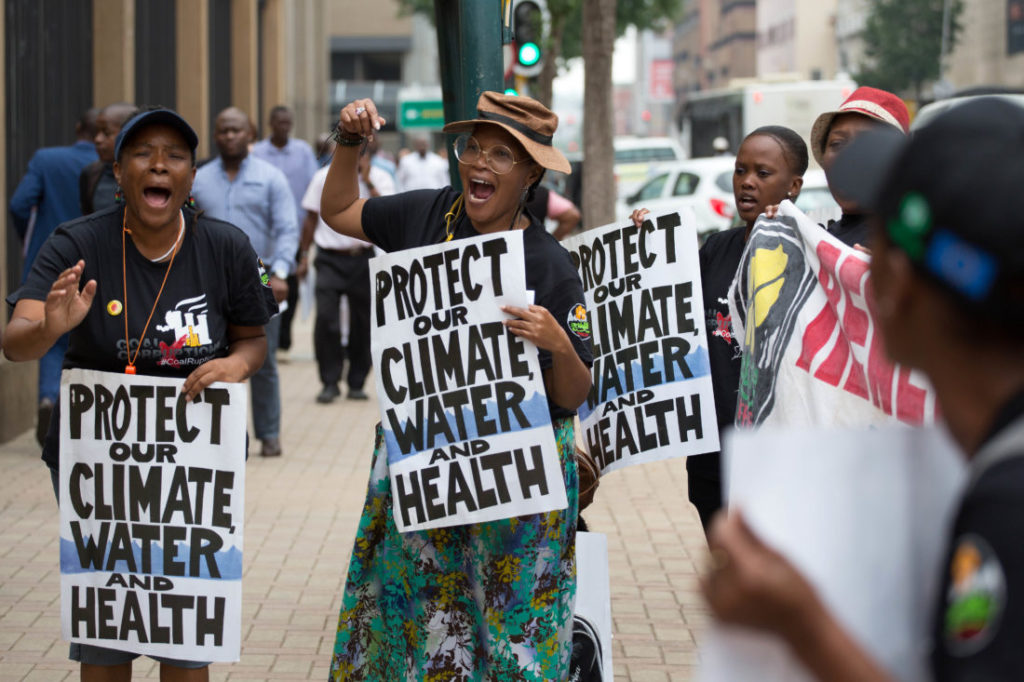How a grassroots movement helped end plans for one of the most carbon-intensive coal power stations on earth

On November 17th, major investors abandoned the Thabametsi coal plant in South Africa: a 557 megawatt power station which would have caused extensive damage to the climate, local people, and scarce water sources in South Africa’s arid Limpopo Province.
This huge victory represents the power of the anti-coal movement in South Africa, a coalition of grassroots organizations committed to a clean energy future.
Global Greengrants Fund is proud to have supported this movement in alliance with South African grassroots groups, such as the Life After Coal coalition. Our grants have funded grassroots groups seeking to ensure consultation with communities who would be affected by the plant’s construction, advocating for legal options to protect both land and people, and fostering sustainable energy alternatives and food production strategies in the area.
Life After Coal – a coalition that includes groundWork (an organization headed by Greengrants Board Member and advisor Bobby Peek), Earthlife Africa Johannesburg, and Centre for Environmental Rights (a longtime grantee) – have challenged the Thabemetsi coal plant in court since 2016. They argued that the former Environment Minister Molewa had disregarded the devastating climate impacts of the project, which would have been one of the most greenhouse gas emission-intensive coal-fired power stations in the world.
Coal is extremely harmful to the environment because it releases toxic greenhouse gases into the atmosphere, accelerating climate change and causing respiratory illness in local people. “In an environment where renewable energy is much cheaper than coal, any new investment in coal power is completely unjustifiable,” says Earthlife Africa Director Makoma Lekalakala. “That is over and above the unconscionable health and environmental costs of coal, which are being borne by communities living in all our coal areas in Mpumalanga, Limpopo and KwaZulu-Natal.”
Thanks to the efforts of Life After Coal, the court ruled in 2017 that the Minister had made a decision to approve the power station without first considering the climate change impacts of the project. The Minister was then ordered to consider a full climate impact assessment for the project before making her decision – a major setback for the project. The Minister re-approved the Thabametsi coal plant in 2018, and the parties had no choice but to challenge that decision in court, which remained pending until November 2020. Since then, the ongoing court battle, continued by grassroots groups fighting against the coal plant, has proven too costly to the investors, resulting in the cancelation of the proposed plant.
Greengrants has worked in concert with groundWork and Life After Coal leaders to get timely funds to grassroots community groups who do not otherwise have ready access to funding, but who nevertheless play an indispensable part of the wider movement. It is critical that those most affected — the frontline communities — have access to direct funding. Our alliance with environmental justice coalitions through our advisory network makes this possible.
In 2013, Greengrants awarded Concerned Citizens of Lephalale $6,000 to participate in consultations on plans for development of the coal fields, and then two grants in 2017 and 2018 to help bolster community resilience and strengthen the anti-coal movement in the frontline communities living in the coal fields. The group conducted trainings to prepare meals without electricity, to develop understanding of sustainable natural resource use for energy, to garden for water scarcity, and to recycle household materials for income generation.
We also provided general support to the Centre for Environmental Rights during the contestation of the Environmental Impact Assessment.
This victory paints a picture of the power of grassroots movements to spark real change. We are inspired by the many environmental defenders across South Africa who banded together to shift the country to a clean energy future without coal.
Congratulations to the South African groups, including many from our global network, who fought hard for this outcome. As it is said in Southern Africa, “A luta continua” – the struggle continues.
Photo credit: James Oatway for Centre for Environmental Rights
